|
Books Should Be Free Loyal Books Free Public Domain Audiobooks & eBook Downloads |
|
|
Books Should Be Free Loyal Books Free Public Domain Audiobooks & eBook Downloads |
|
Poetry |
|---|
|
Book type:
Sort by:
View by:
|
By: Alexander Pope | |
|---|---|
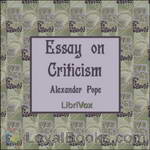 An Essay on Criticism
An Essay on Criticism
An Essay on Criticism was the first major poem written by the English writer Alexander Pope (1688-1744). However, despite the title, the poem is not as much an original analysis as it is a compilation of Pope’s various literary opinions. A reading of the poem makes it clear that he is addressing not so much the ingenuous reader as the intending writer. It is written in a type of rhyming verse called heroic couplets. | |
By: James Boswell (1740-1795) | |
|---|---|
 No Abolition of Slavery Or the Universal Empire of Love, A poem
No Abolition of Slavery Or the Universal Empire of Love, A poem
| |
By: Amy Lowell (1874-1925) | |
|---|---|
 Dome of Many-Coloured Glass
Dome of Many-Coloured Glass
This is a collection of lyrical poems, sonnets and verses for children by Amy Lowell."For quaint pictorial exactitude and bizarrerie of color these poems remind one of Flemish masters and Dutch tulip gardens; again, they are fine and fantastic, like Venetian glass; and they are all curiously flooded with the moonlight of dreams. . . . Miss Lowell has a remarkable gift of what one might call the dramatic-decorative. Her decorative imagery is intensely dramatic, and her dramatic pictures are in themselves vivid and fantastic decorations." (Richard Le Gallienne, 'New York Times Book Review', 1916) | |
 Men, Women and Ghosts
Men, Women and Ghosts
This is a collection of long poems and short stories by Amy Lowell. | |
By: Paul Verlaine (1844-1896) | |
|---|---|
 Poems of Paul Verlaine
Poems of Paul Verlaine
| |
By: William Morris (1834-1896) | |
|---|---|
 The Tale of Beowulf Sometime King of the Folk of the Weder Geats
The Tale of Beowulf Sometime King of the Folk of the Weder Geats
| |
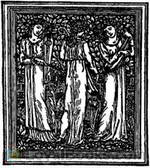 The Earthly Paradise
The Earthly Paradise
| |
By: Alfred Noyes (1880-1958) | |
|---|---|
 Watchers of the Sky
Watchers of the Sky
| |
 Drake
Drake
Alfred Noyes, in the blank-verse epic "Drake", fictionalizes the historical Francis Drake, who, during the reign of Elizabeth I of England, sailed (and plundered) on the Spanish Main and beyond. | |
 The Lord of Misrule And Other Poems
The Lord of Misrule And Other Poems
| |
By: William Dean Howells (1837-1920) | |
|---|---|
 The Daughter of the Storage And Other Things in Prose and Verse
The Daughter of the Storage And Other Things in Prose and Verse
| |
 Poems
Poems
| |
By: Carl Sandburg (1878-1967) | |
|---|---|
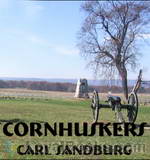 Cornhuskers
Cornhuskers
Carl Sandburg’s collection of 103 poems that earned a Pulitzer Prize Special Letters Award in 1919. | |
By: Hilaire Belloc (1870-1953) | |
|---|---|
 Cautionary Tales for Children
Cautionary Tales for Children
| |
By: Bret Harte (1836-1902) | |
|---|---|
 What the Wolf Really Said to Little Red Riding Hood
What the Wolf Really Said to Little Red Riding Hood
Francis Bret Harte was an American author and poet, best remembered for his short fiction featuring miners, gamblers, and other romantic figures of the California Gold Rush. In a career spanning more than four decades, he wrote poetry, fiction, plays, lectures, book reviews, editorials, and magazine sketches in addition to fiction. As he moved from California to the eastern U.S. to Europe, he incorporated new subjects and characters into his stories, but his Gold Rush tales have been most often reprinted, adapted, and admired. | |
 Excelsior
Excelsior
| |
By: William McGonagall (1825-1902) | |
|---|---|
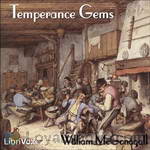 Temperance Gems
Temperance Gems
Good people all, of every degree,I pray, ye all be warned by me:I advise ye all to pause and think,And never more to taste strong drink. Some people do say it is good when taken in moderation,But, when taken to excess, it leads to tribulation,Also to starvation and loss of reputation,Likewise your eternal soul’s damnation. McGonagall has been widely acclaimed as the worst poet in British history. He campaigned vigorously against excessive drinking, appearing in pubs and bars to give edifying poems and speeches... | |
By: G. K. Chesterton (1874-1936) | |
|---|---|
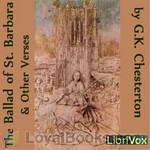 The Ballad of St. Barbara and Other Verses
The Ballad of St. Barbara and Other Verses
This book of poetry by G.K. Chesterton, originally published in 1922, contain 35 poems on a variety of subjects. | |
By: Hopkins, Gerard Manley (1844-1889) | |
|---|---|
 Poems of Gerard Manley Hopkins, ed. Robert Bridges
Poems of Gerard Manley Hopkins, ed. Robert Bridges
Gerard Manley Hopkins (1844–89) was an English poet, educated at Oxford. Entering the Roman Catholic Church in 1866 and the Jesuit novitiate in 1868, he was ordained in 1877. Upon becoming a Jesuit he burned much of his early verse and abandoned the writing of poetry. However, the sinking in 1875 of a German ship carrying five Franciscan nuns, exiles from Germany, inspired him to write one of his most impressive poems “The Wreck of the Deutschland.” Thereafter he produced his best poetry, including “God’s Grandeur,” “The Windhover,” “The Leaden Echo,” and “The Golden Echo.” | |
By: Sophocles (495-406 BC) | |
|---|---|
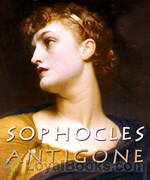 Antigone
Antigone
This is the final installment in Sophocles's Theban Plays, following Oedipus Rex and Oedipus at Colonus. Oedipus's daughter Antigone deliberately breaks the laws of Thebes when she buries her brother's body and is sentenced to death. She clashes with Creon, the King of Thebes, over what constitutes justice and morality: the laws of the state or the laws of the individual. | |
By: William Ross Wallace (1819-1881) | |
|---|---|
 The Hand that Rocks the Cradle is the Hand that Rules the World
The Hand that Rocks the Cradle is the Hand that Rules the World
For Mother’s Day 2006, we’ve recorded five versions of this tribute to Mothers and their role in shaping the future. The title is very famous out of its context, but now you can hear how it was originally intended. | |
By: Christopher Morley (1890-1957) | |
|---|---|
 Mince Pie
Mince Pie
Mince Pie is a compilation of humorous sketches, poetry, and essays written by Christopher Morley. Morley sets the tone in the preface: "If one asks what excuse there can be for prolonging the existence of these trifles, my answer is that there is no excuse. But a copy on the bedside shelf may possibly pave the way to easy slumber. Only a mind "debauched by learning" (in Doctor Johnson's phrase) will scrutinize them too anxiously." | |
 Songs for a Little House
Songs for a Little House
| |
By: John Greenleaf Whittier | |
|---|---|
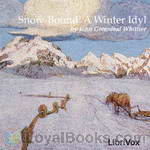 Snow-Bound: A Winter Idyl
Snow-Bound: A Winter Idyl
A 750-line idyllic poem about a snow-storm from the narrator’s childhood. | |
 Snow-Bound A Winter Idyll
Snow-Bound A Winter Idyll
| |
 Christmas Carmen
Christmas Carmen
John Greenleaf Whittier was an American Quaker poet and advocate of the abolition of slavery in the United States. Frequently listed as one of the Fireside Poets, Whittier was influenced by the Scottish poet Robert Burns. | |
 The Works of Whittier, Volume III (of VII) Anti-Slavery Poems and Songs of Labor and Reform
The Works of Whittier, Volume III (of VII) Anti-Slavery Poems and Songs of Labor and Reform
| |
 Anti-Slavery Poems I. From Volume III., the Works of Whittier: Anti-Slavery Poems and Songs of Labor and Reform
Anti-Slavery Poems I. From Volume III., the Works of Whittier: Anti-Slavery Poems and Songs of Labor and Reform
| |
 Anti-Slavery Poems III. From Volume III., the Works of Whittier: Anti-Slavery Poems and Songs of Labor and Reform
Anti-Slavery Poems III. From Volume III., the Works of Whittier: Anti-Slavery Poems and Songs of Labor and Reform
| |
 Anti-Slavery Poems II. From Volume III., the Works of Whittier: Anti-Slavery Poems and Songs of Labor and Reform
Anti-Slavery Poems II. From Volume III., the Works of Whittier: Anti-Slavery Poems and Songs of Labor and Reform
| |
 Songs of Labor and Reform From Volume III., the Works of Whittier: Anti-Slavery Poems and Songs of Labor and Reform
Songs of Labor and Reform From Volume III., the Works of Whittier: Anti-Slavery Poems and Songs of Labor and Reform
| |
By: C. J. Dennis (1876-1938) | |
|---|---|
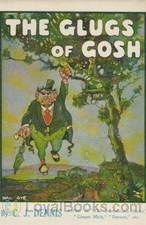 The Glugs of Gosh
The Glugs of Gosh
First published in 1917, The Glugs of Gosh satirizes Australian life at the start of the twentieth century – but the absurdities it catalogs seem just as prevalent at the start of the twenty-first. The foolishness of kings, the arrogance of the elite, the gullibility of crowds, the pride of the self-righteous, the unthinking following of tradition – all find themselves the targets of C. J. Dennis’ biting wit. | |